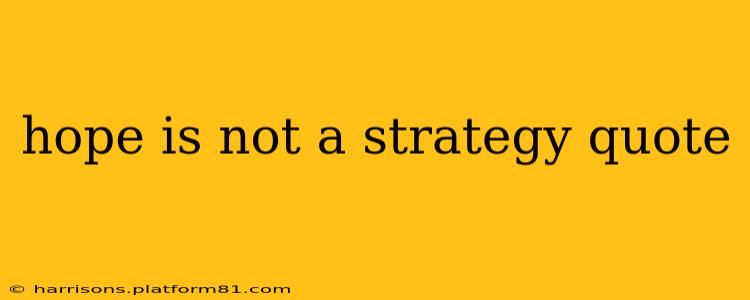"Hope is not a strategy" – this powerful quote highlights a crucial truth about achieving goals, whether personal or professional. While optimism and a positive outlook are invaluable, relying solely on hope without a concrete plan is a recipe for disappointment. This article delves into why a well-defined strategy is paramount for success and explores how to transition from hopeful wishing to proactive planning.
What Does "Hope Is Not a Strategy" Really Mean?
The adage "hope is not a strategy" emphasizes the importance of proactive planning over passive optimism. Hoping for a positive outcome isn't enough; you need a clear roadmap, defined steps, and contingency plans to navigate challenges and achieve your objectives. It's about replacing wishful thinking with deliberate action. Simply hoping for success in business, for instance, won't lead to growth; you need a comprehensive marketing strategy, a strong team, and a robust financial plan.
Why is a Strategy Crucial for Success?
A robust strategy provides several critical benefits:
- Clarity and Direction: A well-defined strategy clarifies your goals, outlines the steps needed to achieve them, and keeps you focused on the path to success. It acts as a compass, guiding your decisions and actions.
- Resource Allocation: Strategies help optimize resource allocation, ensuring you're investing time, money, and energy effectively towards your objectives. This prevents wasted effort and maximizes your chances of success.
- Risk Mitigation: A thorough strategy anticipates potential challenges and develops contingency plans to mitigate risks. This proactive approach helps you navigate unforeseen obstacles and stay on track.
- Measurable Progress: A good strategy includes key performance indicators (KPIs) that allow you to track progress, identify areas needing improvement, and make necessary adjustments along the way. This data-driven approach ensures you're moving in the right direction.
- Increased Confidence: Having a concrete plan instills confidence and reduces anxiety. Knowing you have a roadmap to follow empowers you to take action and persevere through challenges.
How to Develop a Winning Strategy
Moving from hope to a successful strategy involves several key steps:
- Define Clear Goals: Begin by establishing specific, measurable, achievable, relevant, and time-bound (SMART) goals. Vague aspirations won't translate into effective strategies.
- Conduct Thorough Research: Gather information, analyze your market, understand your competition, and identify potential opportunities and threats.
- Develop Actionable Steps: Break down your goals into smaller, manageable steps. This creates a clear roadmap with milestones you can track.
- Allocate Resources Effectively: Determine the resources needed (time, money, personnel) and allocate them strategically to maximize impact.
- Monitor Progress and Adapt: Regularly track your progress against your KPIs. Be prepared to adapt your strategy based on the data and any unforeseen circumstances.
What are the Differences Between Hope and Strategy?
The core difference boils down to action. Hope is passive; it's a feeling or expectation. Strategy is active; it's a plan of action. Hope waits for things to happen; strategy makes things happen.
Is Hope Completely Useless?
While hope isn't a strategy, it's not entirely useless. A healthy dose of optimism can fuel motivation and resilience. However, it should be coupled with a strong strategy to guide your actions and increase your chances of success.
How Can I Turn Hope into a Strategy?
The key is to translate your hopes and aspirations into concrete, actionable steps. For instance, if you hope to start a business, translate that hope into a business plan with market research, a financial forecast, and a marketing strategy.
Conclusion: From Hope to Action
"Hope is not a strategy" is a potent reminder that success requires planning, action, and continuous adaptation. While optimism is important, it must be paired with a well-defined strategy to achieve your goals. By shifting from passive hope to proactive planning, you can increase your chances of achieving your aspirations and realizing your full potential. Remember, a successful strategy is not a static document; it's a living roadmap that evolves with changing circumstances and new insights.
